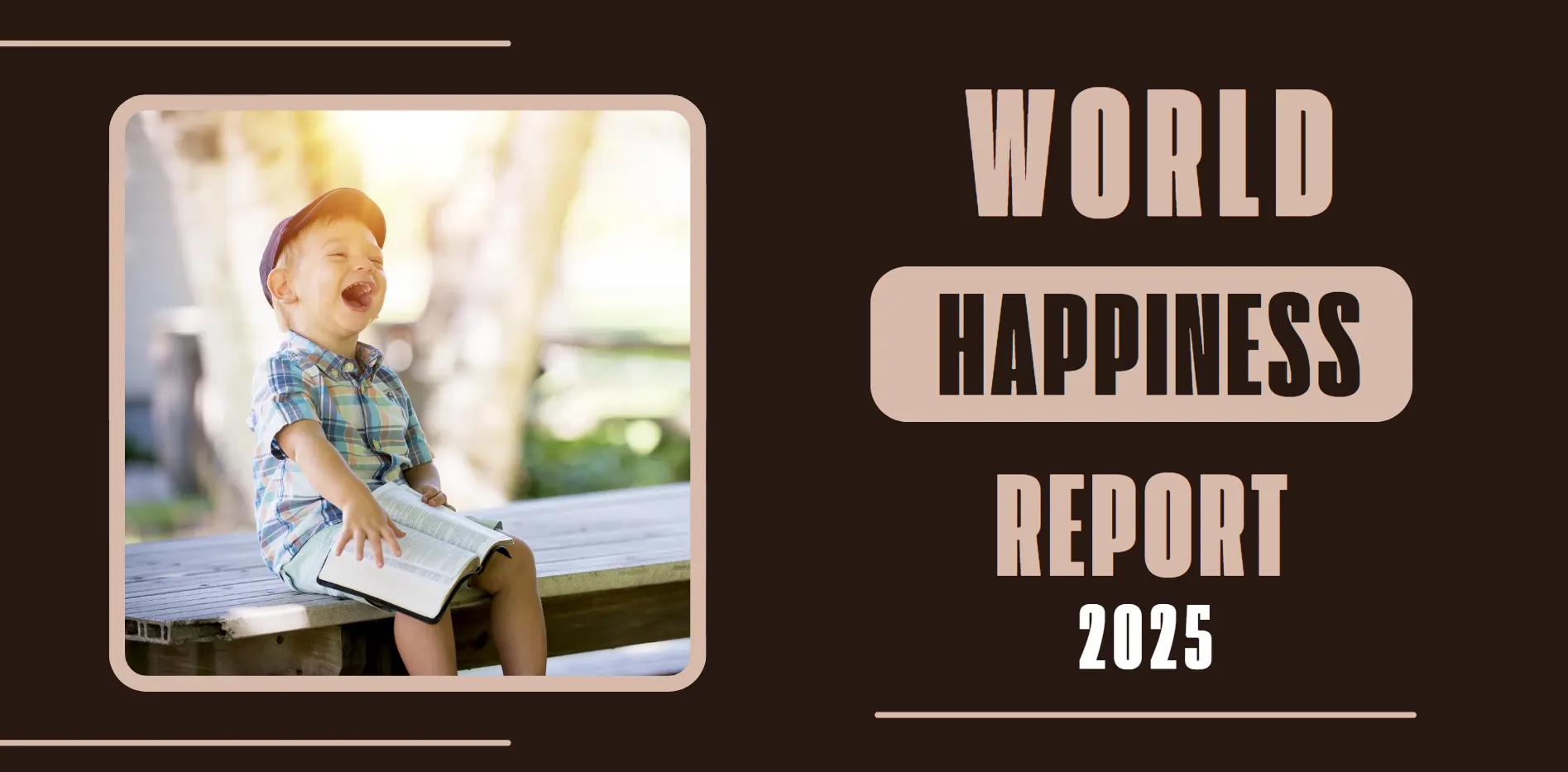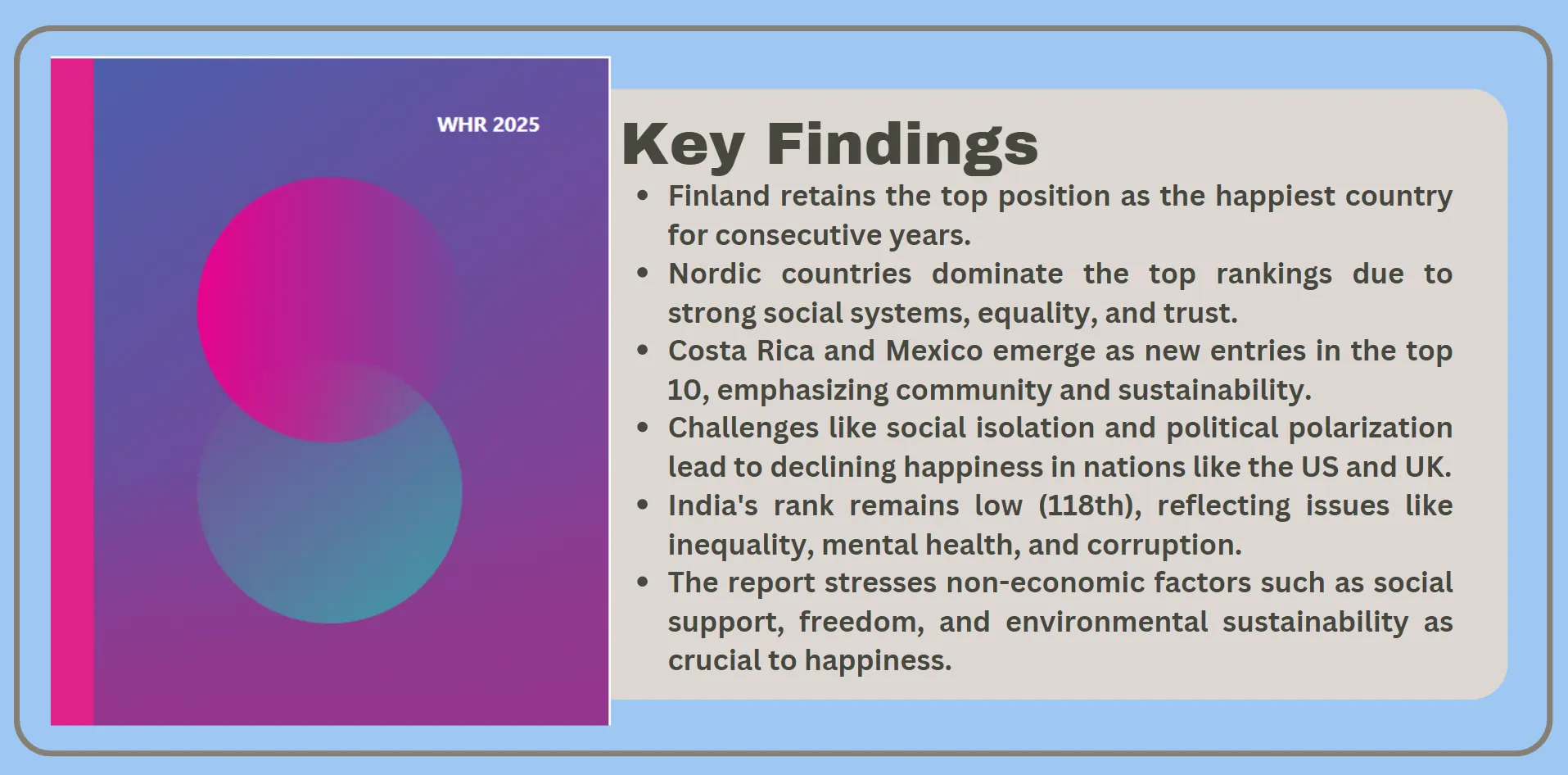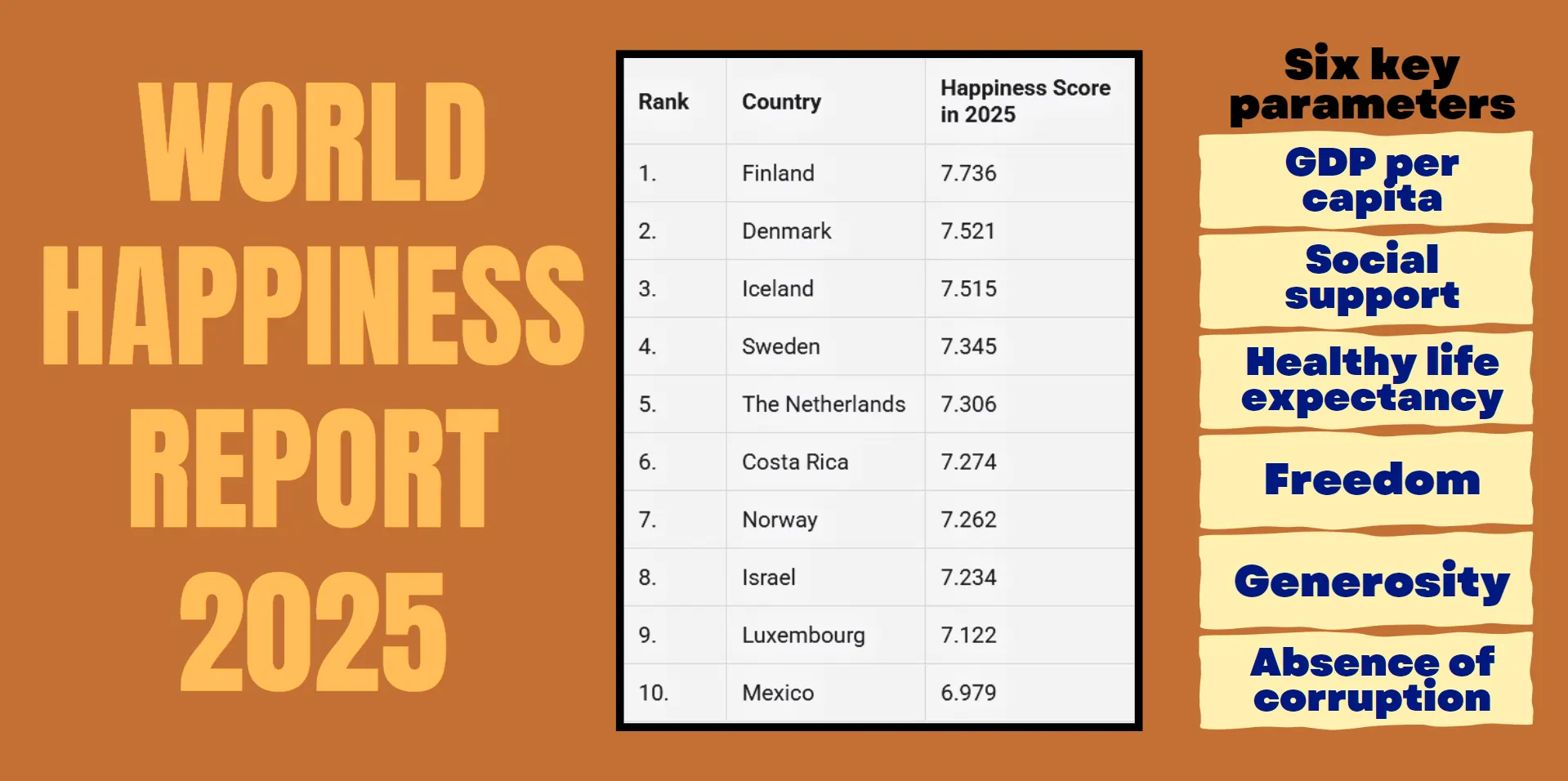The World Happiness Report for this year features unexpected shifts because various countries descended into their lowest positions alongside new entrants that changed the order of the top 10 countries. The Indian government places emphasis on carrying out considerable reforms.

The World Happiness Report 2025 demonstrates that Finland successively holds the position as the world's happiest country for multiple years. The annual assessment based on social, economic and cultural aspects presents a photographic view of worldwide quality of life and delivers valuable knowledge about societal success factors. The recent report shows Nordic countries lead all rankings due to their robust social frameworks together with their tight-knit community values. The list of top 10 nations featured Costa Rica and Mexico because both demonstrate successful cultural unity combined with environmentally friendly lifestyle choices. India along with other nations struggles with distinctive challenges because their ratings remain lower. This article studies the elements which shape different nation's happiness scores while identifying global well-being lessons to implement worldwide.
Feature of the World Happiness Report 2025
The World Happiness Report 2025 highlights fundamental aspects of worldwide happiness evolution by exposing the elements which enhance social well-being status. The rank of being the happiest nation once again goes to Finland which demonstrates how social trust and healthcare quality and community strength create ideal happiness conditions. The Scandinavian countries Denmark, Iceland and Sweden maintain leadership positions as they demonstrate that equality and sustainability and cultural integration create pleased citizens.
The new report introduces two new entries to the top 10 list which includes Costa Rica and Mexico. National success depends on social cohesion along with culture and environmental conservation which creates happiness for citizens. America and the United Kingdom experience decreased happiness rankings according to the research which signals the existence of social fragmentation along with political conflicts in those countries.

The report presents evidence that mental health along with freedom now bring the most significant influence on happiness levels. The rankings in the report are determined by six essential criteria including GDP per capita, life expectancy, corruption level, social support, freedom and Generosity which reveals happiness encompasses various dimensions. The 2025 update of the report rejects the misconception that wealth drives happiness by recommending nations to put equity, trust and community well-being as primary values for creating happiness and world resilience.
Finland's Success Story
The world recognizes Finland as the happiest country because of its extraordinary methods for building well-being within society. The basis of Finland's success emerges from its robust welfare system because this system provides citizens with excellent health services and comprehensive education and stark social prevention. The basic foundation of these services creates a stress-free environment and equality which enables people to find happiness through secure stability and fulfilment.
The people of Finland attribute their happiness to their tradition of nature appreciation and sustainability respect. The combination of extensive forests coupled with pure lakes and environmental proximity enables Finnish people to experience mental wellness from hiking and skiing and their traditional sauna practices. Finns derive their positive outlook from "sisu" which is their term describing resilience and determination.
The country of Finland surpasses many nations in building social trust platforms. Through the practice of trust citizens form alliances with their government and institutions along with each other leading to social unity. The country proves that communities built on fairness and transparency will delight their members when values like equality and anti-corruption are practiced rigorously.
The Finnish model of happiness through social cohesion combined with sustainability coupled with trust serves as an inspirational framework which makes nations worldwide focus on well-being instead of traditional progress indicators.
The Nordic Dominance
Finland and its neighbouring countries Denmark along with Iceland and Sweden and Norway consistently place at the top of the World Happiness Report because they have developed a distinctive approach to societal well-being. These countries master the art of state management through an ecosystem which centres on equity and sustainability and promotes community values.
The social welfare systems of Nordic countries establish universal access to Healthcare, Education and Social Security as their primary advantage for domination. Real security alongside ample support for citizens exists through widespread policies which serve to decrease anxiety levels while developing a protective environment. High trust levels in government institutions together with transparency and accountability mechanisms promote social cohesion because Nordic governance operates with integrity.
Work-life balance as a concept represents another major contributor to Nordic public happiness. People in these nations achieve complete satisfaction through their combination of limited workdays and extensive family time alongside long parent care terms which together create satisfying and balanced existence. The nature-based lifestyle together with environmental protection activities help people maintains their mental health.
These nations value the promotion of equal rights for women and men together with communal participation while providing resident’s freedom in the decisions they make about their lives. Happiness exists beyond wealth limitations because societies thrive through balanced connections between sustainability and trust as well as stability between people and the environment. The Nordic approach provides essential guides to nations that wish to enhance their happiness levels and their general life quality.
The World Happiness Report
Each year the World Happiness Report produces rankings that evaluate the happiness levels and complete well-being of nation citizens. As a creation of the United Nations Sustainable Development Solutions Network in 2012 this report promotes happiness and economic frameworks to track social advancement. The latest 2025 version maintains the tradition by delivering extensive information about worldwide happiness satisfaction levels.
How It Is Calculated?
Public data used to create World Happiness Report rankings originates mainly from Gallup surveys that utilize Cantril Ladder assessments for participant life evaluation. The system requires respondents to evaluate their life satisfaction at present by selecting numbers between 0 and 10 with 0 representing the worst possible life experience and 10 representing the best possible life experience. The starting point of happiness rankings depends exclusively on self-evaluation results.
Subjective well-being scores serve as the base for this study which combines them with six fundamental elements that drive happiness levels.
- GDP Report as per Capita: The economic value of each person's consumption or income works as a happiness factor because it enables access to resources along with opportunities.
- Social Support: Individuals can measure their sense of having trustworthy and purposeful social relationships through Social Support assessments.
- Healthy Life Expectancy: People commonly assume that their ability to enjoy long lives without illness stands as a crucial element which determines how happy they become.
- Freedom to Make Life Choices: When people possess life decision freedom combined with communal independence it increases their well-being scores.
- Generosity: Elaborate gestures of providing support to others create joy and community bonds through positive emotional responses and communal connections.
- Perception of Corruption: The reduction of corruption allows people to establish trust toward institutions thus leading to happier societies.
Each country receives a happiness score from the combination of weighted elements included in the assessment method.

Broader Insights
The rankings system represents just one segment of the analysis which extends to study worldwide and regional developments. The research evaluates happiness effects generated by modifications in social structures, economic conditions and public policies during worldwide crises like pandemics and climate change impacts. The report reveals essential sectors which nations should focus on for maximizing their citizen quality of life.
According to the World Happiness Report happiness does not depend only on financial success. Equity together with trust and sustainability form the core elements which shape well-being according to this framework. Through this comprehensive approach the report functions as an indispensable guide which directs countries toward a better content future through collective pursuit of worldwide happiness goals.
India and World Happiness Report
India stands at position 118 in the World Happiness Report 2025 because it faces difficulties enhancing its overall happiness although it shows significant economic development together with its cultural depth. India has made strides which show progress through its ranking but continues to face on-going obstacles which impact the welfare of its numerous citizens.
India's Ranking and Context
The World Happiness Report shows India holds a position that falls behind multiple neighbouring nations especially Nepal together with Bangladesh regarding various happiness standards. The meaningful gap between Global Happiness ratings and India's development attracts attention related to its advantageous resources and cultural diversity. Although India has improved its infrastructure technology and urbanization capabilities the population disparities hinder consistent happiness benefits across all groups.
Challenges behind India's Lag
The fifth biggest economy in the world currently maintains substantial economic imbalances that impact a large part of its population. Many residents in India cannot obtain vital needs which include high-quality medical care and proper educational services with clean water access. Overall happiness suffers due to this inequality which produces discontent among the groups who are marginalized.
India faces significant challenges regarding mental health because the nation maintains poor funding rates for mental services along with social stigmas regarding psychological conditions. People suffer from more mental health problems because stress levels rise alongside urbanization as well as socio-economic pressures. The shortage of mental health services creates more difficulties in the situation.
Public institutions along with transparent government operations serve as essential factors that impact the level of happiness within a society. Indian citizens feel discouraged about their capacity to develop meaningful improvements within their neighbourhoods because they see corruption as an on-going problem throughout the country.
Social support as well as freedom to make choices is perceived less favourably in India compared to other high-ranking nations. People within traditional social systems must follow restrictions limiting their personal choices yet rural and urban assistance networks do not offer reliable support.
The quality of life in India suffers because of massive pollution together with environmental deterioration. It deals with significant air and water pollution issues whereas rural territories experience deforestation and diminishing natural resources problems.
The steps India must take in order to improve its situation
India needs to use an extensive method that improves citizen lives throughout all sectors for a better placement in the World Happiness Report. Economic development stands vital yet an extended approach concentrating on welfare improvement combined with equality enhancement and sustainability principles would greatly boost happiness measurements.
Strengthening Social Support Systems
India requires the implementation of strong social networks which provide citizens support and social connections. Community well-being will improve when India funds mental health services as well as develops local community facilities to strengthen interpersonal relationships through neighbourhood-led programs. Dismissive barriers to affordable healthcare services must be eliminated across urban and rural settings to found societal happiness.
Tackling Inequality and Poverty
The level of economic inequality stands as the main obstacle which prevents Indians from finding happiness. Strategic policy measures focusing on inclusive development together with unemployment generation and poverty reduction programs should work to narrow the wealth disparity between wealthy and poor population segments. Social welfare programs need expansion to offer housing subsidies as well as health care subsidies and educational support which will benefit vulnerable populations and elevate general societal quality of life.
Prioritizing Mental Health Awareness
Health issues related to mental difficulties still carry heavy stigma throughout Indian society. National awareness campaigns led by the government must happen simultaneously with efforts to decrease the stigma along with support for people who need help. Providing young people and working professionals with expanded access to mental healthcare through professionals and counseling centres and helplines serves to address their increasing mental health needs.
Combatting Corruption
When corruption occurs in society it drives trust away from institutional bodies and simultaneously reduces the general happiness of citizens. When combined with mandated anti-corruption rules and stronger oversight of public servants the public will regain trust in their government leadership. Transparent and efficient systems create an environment where people gain power over their circumstances and demonstrate increased engagement.
Enhancing Environmental Quality
The current state of environmental degradation heavily affects the overall life quality standards. India needs to make sustainable development its top priority through efforts against pollution sources and the protection of natural resources and the implementation of environmentally conscious urban development plans. Healthy living environments will emerge from reforestation drives combined with clean energy projects alongside tighter pollution control regulations.
Promoting Freedom and Personal Choice
The improvement of happiness depends heavily on fostering personal choices along with individual expression. Through gender equal, free speech and cultural diversity-supporting policies citizens can live better fulfilling lives and feel included.
Community and cultural initiatives
The multiple elements of Indian cultural heritage represent an opportunity to develop stronger neighbourhoods among residents. Through cultural festivals and artistic events alongside exchange opportunities India can develop stronger relationships between citizens which fosters a unified sense of community.
Conclusion
According to the 2025 World Happiness Report well-being plus trust along with equity serve as crucial benchmarks for tracking national developments. The strength of Finnish success along with Nordic leadership exemplifies a winning methodology to build happiness through strong social programs, sustainable efforts and united cultural consistency. The report functions as a critical warning for India and other nations to address their problems with inequality and mental health while facing environmental issues. Countries that study worldwide developments and enact modern regulating policies will establish a better existence for their citizens. All individuals seek happiness as a universal objective which links people from diverse regions because happiness belongs to everyone.